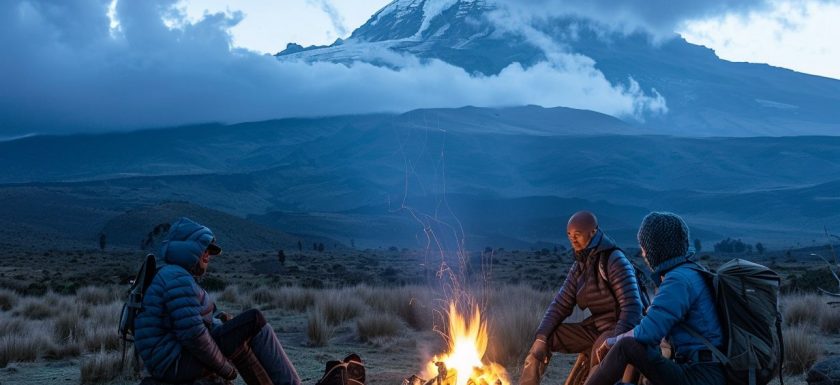
Are you preparing for a climb up Kilimanjaro and wondering what to eat along the way?Your diet plays a crucial role in fueling your body and keeping you strong during this challenging adventure.
We will discuss the essential foods to consume while climbing Kilimanjaro, how to prepare for the Kilimanjaro diet, foods to avoid, a sample meal plan, and final tips for eating on the mountain.
Key Takeaways:
- Fuel your body with carbohydrates for energy on Kilimanjaro.
- Pack protein-rich foods to repair and maintain muscle during the climb.
- Stay hydrated and replenish electrolytes with fruits, vegetables, and snacks for sustained energy.
What to Eat While Climbing Kilimanjaro?
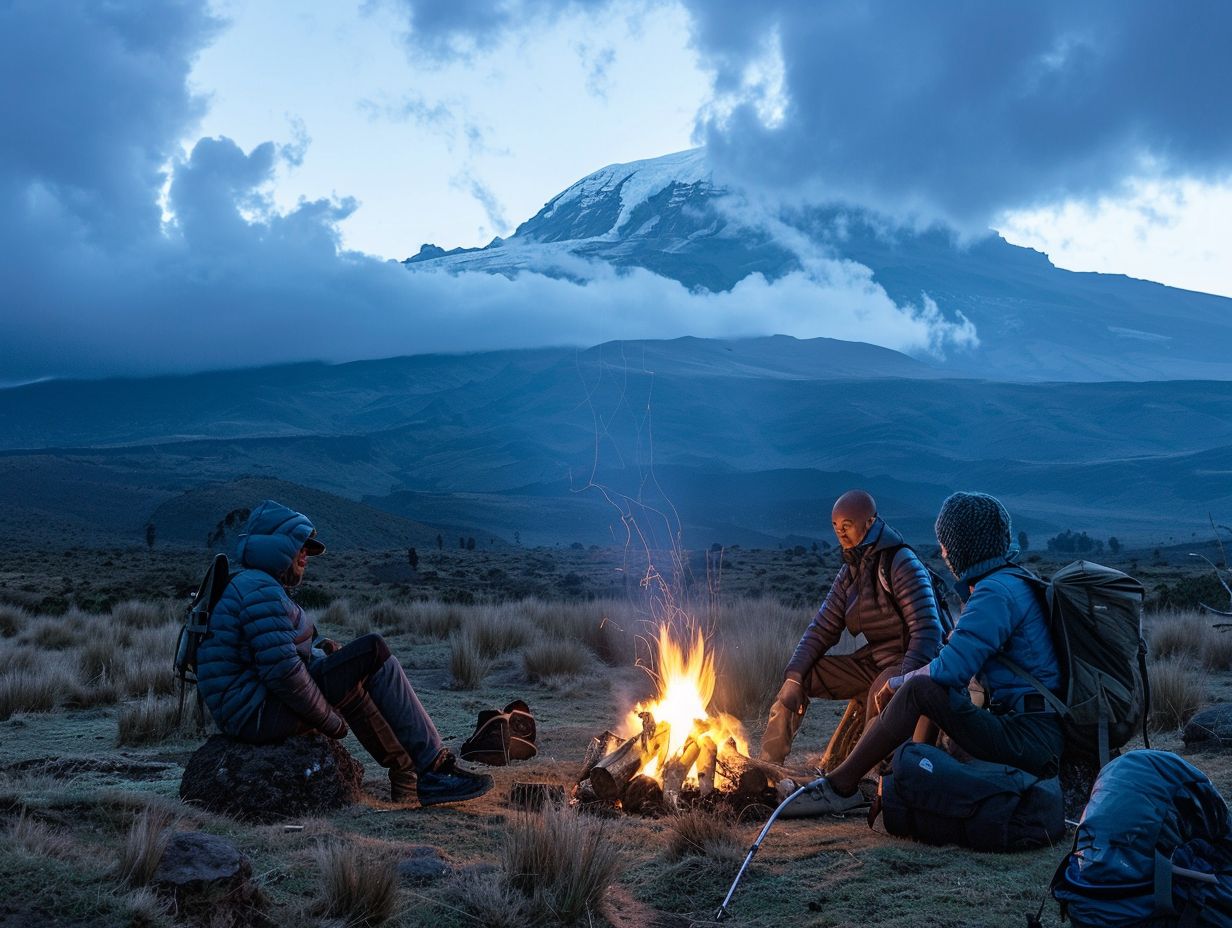
When climbing Kilimanjaro, it is crucial to consume a diet rich in carbohydrates to fuel your body with the necessary energy for the ascent.
Meals like breakfast, lunch and dinner should include sources of carbohydrates such as grains, fruits and vegetables, along with snacks like jerky and gummies to sustain climbers throughout their journey.
Carbohydrates are the primary source of energy for our bodies, especially during physically demanding activities like mountain climbing.
They provide quick-burning fuel that is essential for sustained endurance and muscle function. Incorporating complex carbohydrates in meals helps release energy gradually, ensuring a steady supply of fuel during the climb.
For breakfast, climbers can opt for oatmeal topped with fruits and nuts, providing a good balance of carbohydrates, proteins, and fats.
Lunch could consist of a whole-grain wrap with lean protein, vegetables, and hummus, while dinner might include sweet potatoes, quinoa and a side of grilled chicken offering a nutritious blend of carbohydrates and proteins.
Portable snack options like beef jerky and energy gummies are convenient and easy to carry during the trek, offering a quick energy boost when needed.
Ensuring a well-rounded carbohydrate intake throughout the day is essential for climbers to maintain their strength and stamina during the challenging ascent of Kilimanjaro.
Carbohydrates for Energy
Carbohydrates play a vital role in providing energy to climbers tackling Kilimanjaro’s altitude. Consuming carbohydrate-rich meals like breakfast, lunch, and dinner, supplemented with snacks such as jerky and gummies, can help sustain energy levels during the climb.
At high altitudes, the body requires more carbohydrates to maintain stamina due to the increased energy expenditure caused by reduced oxygen levels.
Foods like oatmeal, whole-grain pasta and quinoa are excellent sources of complex carbohydrates that release energy gradually, ensuring a steady supply of fuel for the muscles.
Carbohydrates are the body’s preferred energy source for physical exertion, making them crucial for climbers facing the rigorous ascent of Kilimanjaro.
Proteins for Muscle Repair
Proteins are essential for muscle repair and recovery, especially for climbers on Kilimanjaro. Given the strenuous physical demands of mountain climbing, ensuring an adequate intake of proteins is crucial for climbers to optimize their performance and enhance their endurance.
Through their role in repairing and rebuilding muscle tissues, proteins help climbers recover faster from the intense physical exertion experienced during the ascent.
Including protein-rich foods such as eggs and chicken in meals, both at lunch and dinner, can provide climbers with the necessary amino acids to support muscle repair, sustain energy levels, and promote overall muscle health.
Fruits and Vegetables for Nutrients
Fruits and vegetables are vital sources of nutrients for climbers on Kilimanjaro, offering essential vitamins and minerals necessary for maintaining overall health and well-being.
Incorporating a diverse range of fruits and vegetables in meals like breakfast, lunch and dinner can ensure climbers receive the necessary nutrients for the ascent. These nutrient-rich foods not only provide the energy needed for the challenging climb but also support recovery and muscle repair.
Fruits like bananas and oranges offer quick boosts of natural sugars for sustained energy, while leafy greens such as spinach and kale are packed with antioxidants and vitamins essential for cellular function and immune support.
Snacks for Sustained Energy
Carrying snacks like trail mix, nuts, and energy sweets is crucial for climbers seeking sustained energy during the Kilimanjaro trek. These portable snacks provide quick bursts of energy and help maintain stamina throughout the climb.
Trail mix, a combination of dried fruits, nuts and seeds, offers a perfect balance of carbohydrates, protein and healthy fats for sustained energy.
Nuts like almonds and walnuts provide a dense source of nutrients and essential fatty acids, while energy sweets such as chews or gels can offer a quick energy boost during challenging segments of the ascent.
Having these energy-boosting snacks readily available in easily accessible pockets or pouches allows climbers to refuel on-the-go, preventing dips in energy levels and optimizing performance. Climbers should aim to snack strategically, consuming small portions at regular intervals to keep their energy levels consistent and avoid fatigue.
Hydration and Electrolyte Sources
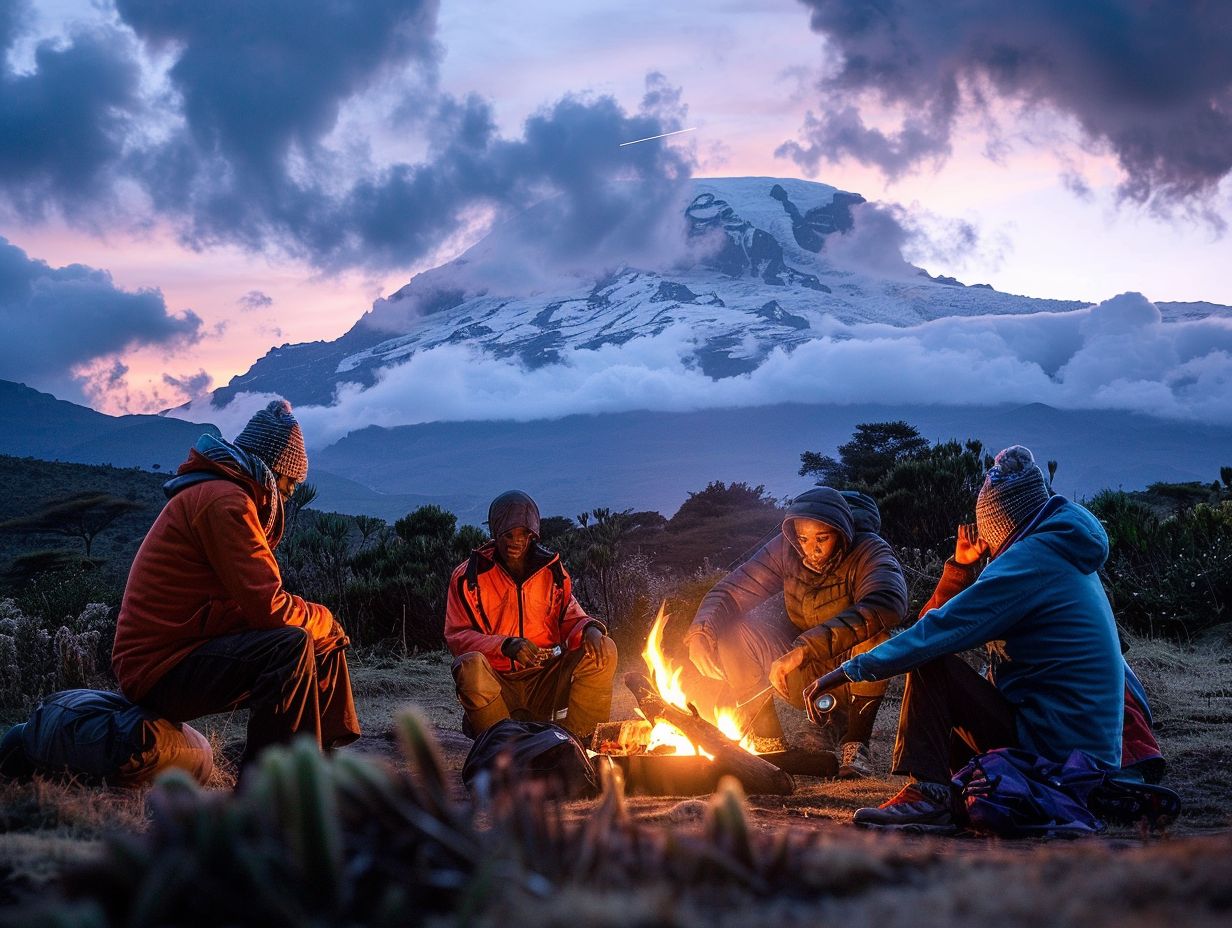
Staying hydrated and replenishing electrolytes is essential for climbers on Kilimanjaro to combat the effects of high altitude. Water, Gatorade, and Nuun tablets are excellent sources of hydration and electrolytes to support climbers during their ascent.
At high altitudes, the air is thinner, leading to increased breathing rate and accelerated fluid loss through respiration. Dehydration can exacerbate altitude sickness symptoms like headache, nausea, and fatigue. Proper hydration aids in acclimatization, enabling climbers to perform better and enjoy the journey with minimal discomfort.
Plus water, electrolyte-rich beverages like Gatorade and specially formulated Nuun tablets with essential minerals play a vital role in replenishing electrolytes lost through sweating and respiration. Electrolytes help regulate muscle function, nerve transmission, and overall hydration levels, crucial for sustained physical exertion.
Maintaining proper fluid and electrolyte balance is key to enhancing endurance and reducing the risk of altitude-related illnesses. Climbers should consistently monitor their hydration levels, incorporating a variety of sources like water, sports drinks, and electrolyte tablets into their climbing routine to ensure they conquer Kilimanjaro successfully.
How to Prepare for the Kilimanjaro Diet?
Preparing for the Kilimanjaro diet involves training your body and mind for the physical and mental challenges of high-altitude climbing. Understanding the nutritional needs and dietary requirements specific to climbing Kilimanjaro is crucial for a successful ascent.
Training for high-altitude climbs goes beyond just physical endurance; it requires mental fortitude and acclimatization to low oxygen levels.
Given the strenuous physical demands of mountain climbing, ensuring an adequate intake of proteins is crucial for climbers to optimize their performance and enhance their endurance.
Engaging in cardio exercises like running, hiking, and cycling can help build the necessary endurance for long climbs. Mental preparation is key; visualization techniques and meditation can help climbers stay focused and calm during challenging moments.
Mental preparation is key; visualization techniques and meditation can help climbers stay focused and calm during challenging moments.
Meeting the high energy demands of climbing necessitates a diet rich in carbohydrates, proteins, and healthy fats.
Hydration is also vital; water intake should be increased to counteract the effects of altitude.
Train Your Body and Mind
Training your body and mind is essential for preparing to climb Kilimanjaro, especially considering the challenges of high altitude and acclimatization. Physical fitness, mental resilience, and acclimatization strategies play a crucial role in ensuring a smooth climb.
Physical training is vital to build the strength and endurance required to tackle the demanding terrain and long hours of trekking at higher altitudes. Focusing on cardiovascular fitness, strength training, and flexibility exercises not only prepares your body but also reduces the risk of injuries during the ascent.
Mental preparedness is equally important, as the mental challenges of high-altitude climbing can be just as taxing as the physical ones. Developing a positive mindset, practicing mindfulness, and honing your mental toughness are key aspects of mental preparation.
The process of acclimatization is crucial for climbers, allowing the body to adjust to decreased oxygen levels at higher altitudes. Gradual ascent, proper hydration, and listening to your body’s signals are essential components of successful acclimatization on a climb like Kilimanjaro.
Pack the Right Foods and Supplements
Packing the right foods and supplements is crucial for climbers embarking on a Kilimanjaro expedition. Planning a balanced menu that meets dietary requirements, choosing appropriate cooking methods, and selecting essential supplements can enhance climbers’ performance and well-being during the climb.
When preparing for the Kilimanjaro climb, it’s essential to consider the calorie density of the food items you pack. Opt for lightweight, nutrient-dense foods.
Such as nuts, seeds, dried fruits and energy bars to ensure you have enough energy reserves. Including dehydrated meals and instant soups can also be convenient options that require minimal cooking equipment.
Incorporating a variety of vitamins and minerals through supplements like electrolyte tablets, vitamin C, and iron can aid in preventing altitude sickness and maintaining strength throughout the journey.
Adjust to High Altitude Eating
Adapting to high-altitude eating habits is essential for climbers preparing for a Kilimanjaro expedition. Understanding the impact of altitude on appetite, hydration needs, and nutritional absorption can help climbers make necessary adjustments to their diet for optimal performance.
At high altitudes, the body’s metabolism increases to cope with the lower oxygen levels, often resulting in decreased appetite. This loss of appetite can be a significant challenge for climbers.
Need sufficient fuel for the strenuous ascent. It’s crucial for climbers to consume calorie-dense foods that are easily digestible, such as nuts, dried fruits, and energy bars, to ensure they meet their energy requirements.
Hydration is another critical aspect of high-altitude eating. Due to increased respiration and sweat rates, climbers lose more fluids at altitude, making it essential to drink plenty of water.
Electrolyte-rich beverages to prevent dehydration. Adequate hydration not only supports physical performance but also helps alleviate symptoms of altitude sickness.
What Foods to Avoid While Climbing Kilimanjaro?
While climbing Kilimanjaro, it is advisable to avoid high-fat and heavy foods that may hinder digestion and energy levels. Staying away from caffeine and alcohol can help climbers better acclimatize to the high altitude and maintain peak performance.
When preparing for a challenging trek like Kilimanjaro, it’s crucial to prioritize foods that are easily digestible and provide sustained energy. Foods high in fat and heavy, greasy meals can slow down digestion, causing discomfort and impacting energy levels during the climb.
Opting for lighter, nutrient-dense options such as fruits, vegetables, lean proteins and whole grains can keep climbers feeling energized without weighing them down.
Avoiding caffeine and alcohol is also key to successful acclimatization. Both substances can dehydrate the body and interfere with sleep patterns, which are essential for adjusting to the altitude.
By eliminating these stimulants, climbers give their bodies the best chance to adapt to the changing conditions and perform optimally while ascending the mountain.
High-Fat and Heavy Foods
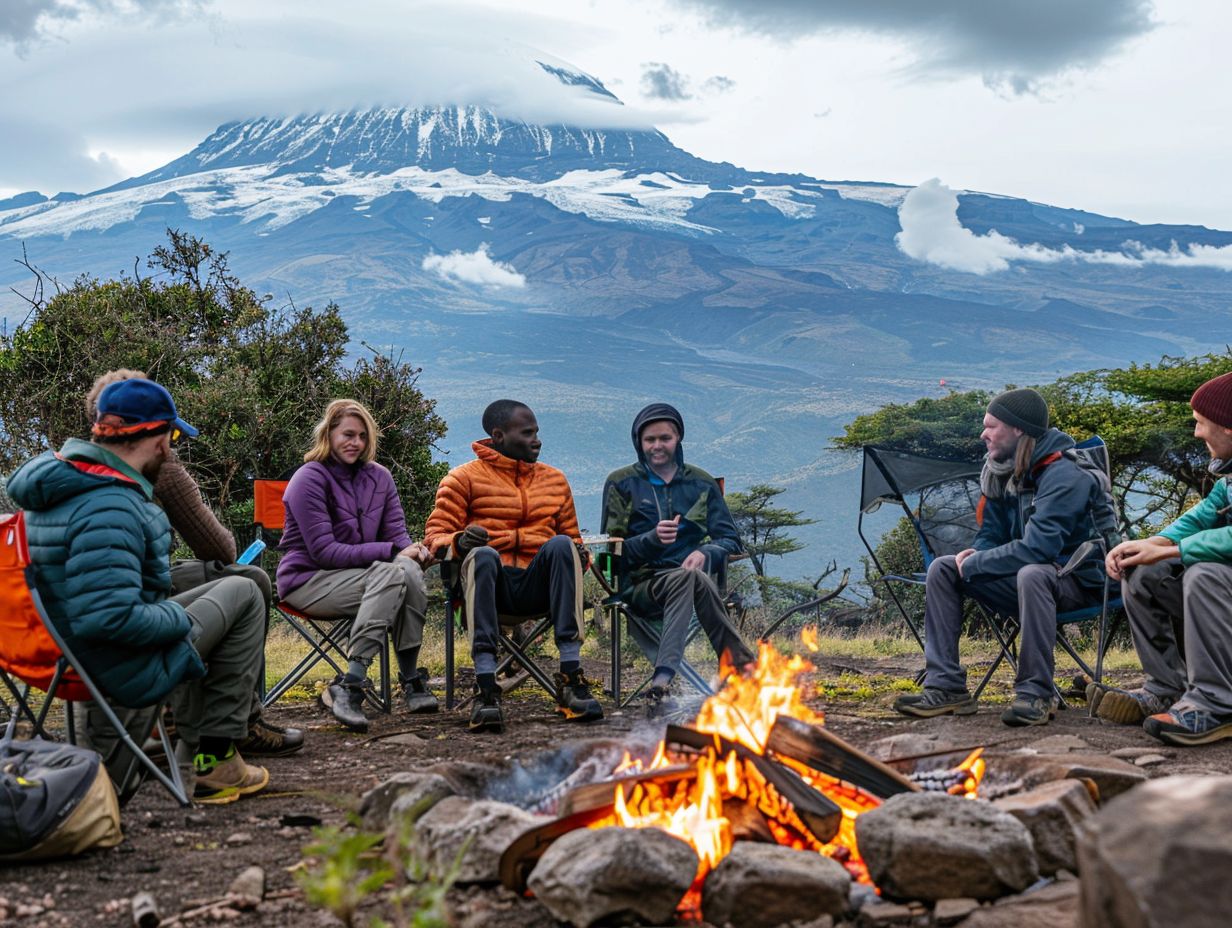
High-fat and heavy foods are best avoided during a Kilimanjaro climb due to their potential negative effects on digestion and energy levels at high altitudes. Opting for lighter, easily digestible meals can support climbers in maintaining optimal nutrition and performance.
When trekking at high altitudes like Kilimanjaro, rich and fatty foods can slow down digestion, leading to discomfort and decreased energy levels. Heavy meals can be harder for the body to process, diverting energy away from the physical demands of the climb.
It’s crucial for climbers to prioritize foods that are nutrient-dense and won’t weigh them down. Instead of greasy dishes, lighter options such as lean proteins, whole grains, fruits, and vegetables are recommended.
These foods provide sustained energy, essential vitamins, and minerals without burdening the digestive system, allowing climbers to feel more agile and focused during the ascent.
Staying properly hydrated and incorporating snacks like nuts, dried fruits, and energy bars can help maintain energy levels throughout the trek.
Caffeine and Alcohol
Caffeine and alcohol consumption should be limited or avoided by climbers on Kilimanjaro to prevent dehydration and support proper acclimatization.
Both caffeine and alcohol have diuretic effects, increasing the risk of dehydration, which can be particularly dangerous at high altitudes.
- Instead, climbers should opt for hydrating beverages such as water, electrolyte-rich drinks, or herbal teas to maintain optimal hydration levels and support their bodies during the challenging ascent.
- Avoiding caffeine and alcohol can also enhance the body’s ability to acclimatize to the altitude, reducing the likelihood of altitude sickness and improving overall performance on the climb.
Processed and Sugary Foods
Avoiding processed and sugary foods while climbing Kilimanjaro is crucial for maintaining stable energy levels and overall health. Opting for nutrient-dense, whole foods can provide climbers with sustained energy and essential nutrients necessary for the arduous journey.
When trekking up Kilimanjaro, the altitude and physical demand can place immense stress on the body. Consuming processed foods high in refined sugars can lead to quick spikes in blood sugar, followed by crashes, leaving climbers fatigued and vulnerable.
In contrast, whole foods like nuts, seeds, lean protein, and complex carbohydrates offer a steady release of energy, supporting endurance and muscle function throughout the climb. By prioritizing nutritious options, climbers can optimize their performance, enhance recovery, and reduce the risk of altitude-related illnesses.
Sample Meal Plan for a Kilimanjaro Climb
A sample meal plan for a Kilimanjaro climb typically includes carbohydrate-rich breakfast options, protein-packed lunches, and nutrient-dense dinners to fuel climbers’ ascent. Incorporating snacks for sustained energy and hydration sources is crucial for a well-rounded meal plan.
For breakfast, consider oatmeal with nuts and dried fruits, providing a mix of complex carbohydrates and healthy fats.Lunch could consist of sandwiches with whole-grain bread, lean meats, and plenty of vegetables for added vitamins and minerals.
At dinner, opt for a hearty meal like chicken stir-fry with brown rice and a side of mixed greens.Snacks such as energy bars, trail mix, and fresh fruit are ideal for quick boosts of energy during breaks.
Staying well-hydrated is key, so packing a water bottle and electrolyte tablets can help prevent dehydration at high altitudes.
Final Tips for Eating on Kilimanjaro
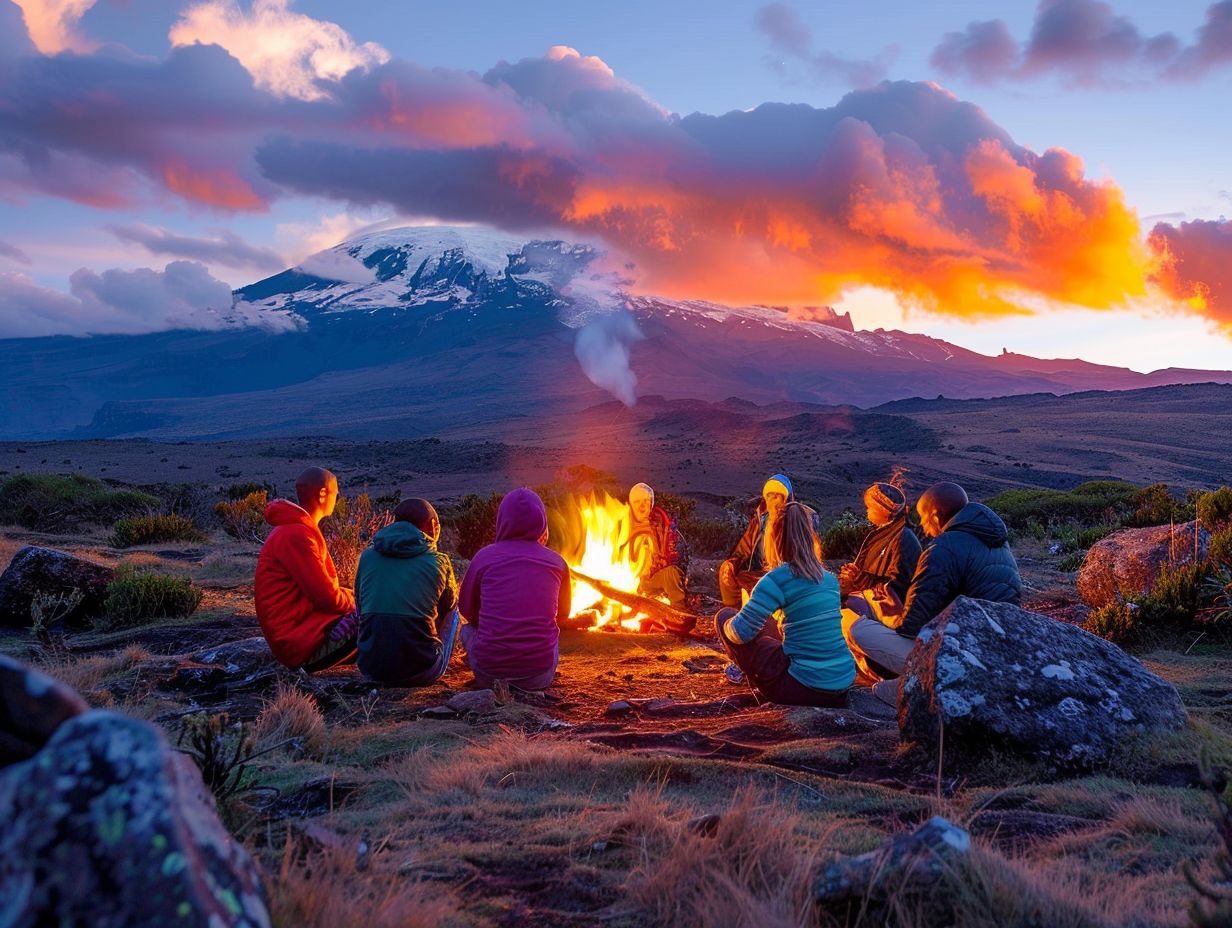
When climbing Kilimanjaro, it’s essential to prioritize nutrition and hydration to support your physical and mental performance. Maintaining a balanced diet, staying hydrated, and choosing the right foods can enhance your climbing experience and increase your chances of reaching the summit successfully.
One key tip for climbers is to bring along high-energy snacks like nuts, dried fruits and energy bars to keep energy levels up during the ascent. Consider incorporating complex carbohydrates and protein-rich foods into your meals to sustain energy for the long climb.
It’s also crucial to drink plenty of water throughout the journey to avoid dehydration in the high-altitude conditions on Kilimanjaro. Planning your meals in advance and packing lightweight, nutritionally dense options can make a significant difference in how you feel during the climb.
Frequently Asked Questions
What do you eat on Kilimanjaro?
The typical diet on Kilimanjaro consists of carbohydrates and proteins, such as rice, pasta, beans, and meat. Fruits and vegetables are also included to provide essential vitamins and minerals. It is important to have a balanced diet to maintain energy and stamina during the climb.
Can I bring my own food on Kilimanjaro?
Yes, you can bring non-perishable snacks and energy bars to supplement your meals. However, it is important to pack light and only bring what you will need for the duration of the climb. Any leftover food should be packed out with you to maintain the mountain’s cleanliness.
What meals are provided on a Kilimanjaro trek?
Most trekking companies provide three meals a day: breakfast, lunch, and dinner. Breakfast usually consists of porridge, eggs, toast, and tea or coffee. Lunch is typically a packed lunch with sandwiches, fruit, and snacks, while dinner is a hot meal with a variety of options.
What do vegetarians and vegans eat on Kilimanjaro?
Vegetarian and vegan options are available on Kilimanjaro treks. Vegetarian meals consist of a variety of vegetables, grains, and legumes. Vegans can expect meals with no animal products, such as lentils, tofu and fresh fruits and vegetables.
Is it safe to eat the food on Kilimanjaro?
The food provided on Kilimanjaro treks is prepared and cooked by trained chefs who follow strict hygiene and safety protocols. Additionally, drinking water is boiled and filtered to ensure it is safe for consumption. As long as you follow these guidelines, it is safe to eat the food provided on the trek.
What should I do if I have dietary restrictions?
If you have any dietary restrictions or food allergies, it is important to inform your trekking company beforehand. They will make arrangements for suitable meals to accommodate your needs. It is also recommended to bring your own snacks and any necessary medications or supplements.